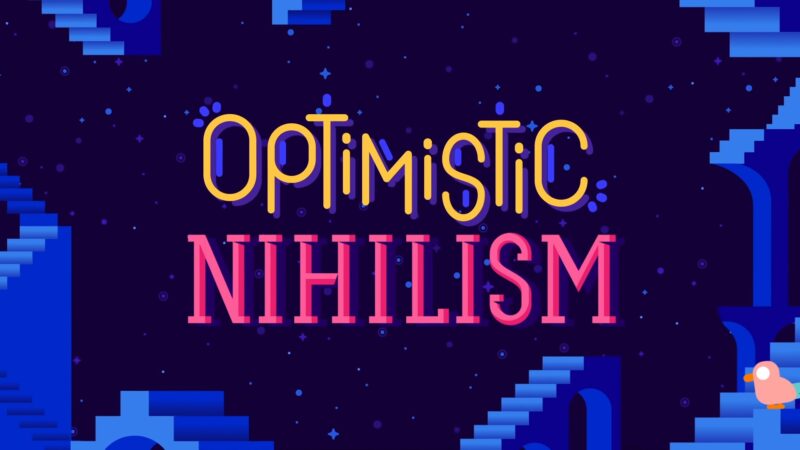In the vast tapestry of philosophical thought, there emerges a seemingly paradoxical perspective known as “Optimistic Nihilism.” But what does this term mean, and how can two seemingly opposing ideas — optimism and nihilism — come together to form a coherent worldview?
Read on to explore the intricacies of this philosophy, how it can be embraced, and the value it might offer to our daily lives.
The Foundations of Optimistic Nihilism
Before we start discussing the philosophy of optimistic nihilism, it’s crucial to grasp its roots. At its core, this philosophy melds elements from both optimism and nihilism to create a unique worldview.
Nihilism: The Abyss of Meaninglessness
Nihilism posits that life has no inherent purpose, meaning, or intrinsic value. This philosophy often leads individuals to confront some of life’s most profound questions, such as:
- Why do we exist?
- What is the purpose of life?
- Why is there something rather than nothing?
The Freedom in Acceptance
Accepting life’s inherent lack of objective meaning might initially appear bleak. However, there’s a liberating quality to this realization. Once we free ourselves from the shackles of pre-defined purpose, we become the architects of our destiny. The canvas of life becomes blank, awaiting our strokes of purpose and intent.
Optimism: The Ray of Hope
Optimism, in contrast to nihilism, encourages a hopeful outlook on life. Optimists believe in the potential for positive outcomes, regardless of life’s adversities. Key tenets of optimism include:
- Expecting the best possible outcome
- Viewing challenges as opportunities
- Believing that negative events are temporary and localized
Harnessing the Power of Perspective
When one adopts an optimistic mindset, even the darkest clouds have silver linings. By focusing on the positive, individuals can cultivate resilience, perseverance, and a sense of fulfillment. Moreover, optimism doesn’t demand a blind eye to life’s challenges; instead, it’s a choice to approach them with hope and determination.
Merging the Philosophies

At first glance, optimism and nihilism might seem irreconcilable. However, when we look deeper, we discover that these two philosophies can be harmoniously united, leading to the birth of optimistic nihilism.
Creating Your Own Meaning
With nihilism’s acknowledgment of life’s lack of inherent meaning, one might ask: “Why bother with anything at all?” The answer lies in optimistic nihilism’s empowering perspective. Life becomes a blank canvas, devoid of preordained purpose, allowing us to:
- Paint our narratives and aspirations
- Define success on our terms
- Choose our battles and passions
The Choice to Be Hopeful
While life might lack objective meaning, it doesn’t devalue the subjective meanings we attribute to it. We have the freedom to create our purpose and pursue it with unyielding optimism.
It’s a conscious decision to recognize life’s inherent meaninglessness but choose to infuse it with hope, passion, and purpose.
Embracing Life’s Absurdity
Life is rife with absurdities, contradictions, and inexplicable phenomena. The optimistic nihilist recognizes this and chooses to embrace it. By accepting life’s inherent contradictions, one can:
- Find humor in the mundane
- Appreciate the unexpected twists and turns
- Revel in the unpredictability of existence
A Dance with the Absurd
Rather than getting bogged down by life’s seeming pointlessness, optimistic nihilism encourages a dance with the absurd.
It’s about finding joy in the journey, savoring the fleeting moments, and cherishing the cosmic joke that is existence. With this perspective, every experience, whether good or bad, adds color and texture to the tapestry of life.
The Implications of Adopting Optimistic Nihilism
Adopting the optimistic nihilist perspective isn’t just a philosophical exercise. It can have profound implications on one’s mental well-being, relationships, and overall approach to life.
Cultivating Resilience
When life throws curveballs, the optimistic nihilist is better equipped to face them. By understanding that life has no guaranteed outcomes and that hardships are inevitable, they:
- Develop coping mechanisms
- Learn from failures
- Adapt and evolve in the face of adversity
Fostering Emotional Equilibrium
With the belief that life’s trials are but temporary and with the power to craft one’s narrative, the optimistic nihilist maintains a balanced emotional state. This mindset promotes:
- Emotional intelligence
- Empathy towards oneself and others
- A grounded perspective in times of crisis
Enhancing Personal Growth
Optimistic nihilism encourages individuals to chart their path. Without societal pressures dictating one’s worth or success, there’s freedom to:
- Explore personal passions
- Set and achieve self-defined goals
- Continuously evolve and redefine oneself
Embracing Change and Uncertainty
In a world devoid of fixed meanings, change is the only constant. The optimistic nihilist thrives in such a setting, viewing change as an opportunity rather than a threat. This perspective fosters:
- Flexibility in thoughts and actions
- A hunger for new experiences
- A willingness to step out of one’s comfort zone
Optimistic Nihilism in Popular Culture
You might be surprised to learn that optimistic nihilism has subtly influenced various forms of media, art, and literature. This influence showcases the philosophy’s profound resonance with contemporary society.
Literary Reflections
Prominent authors have danced with the theme of life’s inherent lack of meaning. Kurt Vonnegut, for instance, often intertwined humor and existential thought in his works. Books like “Slaughterhouse-Five” touch upon:
- The absurdity of existence
- The unpredictability of life
- Finding solace amidst chaos
Crafting New Narratives
Contemporary authors, realizing the freedom of a blank existential canvas, venture into crafting unique narratives. They highlight:
- Individual quests for self-defined purpose
- The beauty in transient moments
- The power of human connection in a seemingly indifferent universe
Film and Television
Several critically acclaimed movies and TV series subtly explore optimistic nihilism. Take, for instance, “The Big Lebowski” or “Rick and Morty.” These productions showcase:
- Characters grappling with existential dilemmas
- Humor derived from life’s inherent meaninglessness
- Celebrations of individuality amidst cosmic indifference
Narratives Beyond Traditional Structures
With the constraints of traditional storytelling lifted, filmmakers and showrunners have crafted stories that break conventions. They explore:
- Non-linear narratives
- Complex character arcs rooted in self-discovery
- Embracing uncertainty as a pivotal plot device
Practical Applications of Optimistic Nihilism

While the philosophical underpinnings of optimistic nihilism are undoubtedly fascinating, it’s equally crucial to understand how one can apply this perspective in day-to-day life.
Daily Decision Making
Freed from the weight of cosmic purpose or destiny, every choice becomes genuinely ours. This freedom impacts daily decision-making, allowing us to:
- Prioritize personal happiness and well-being
- Make choices aligned with self-defined goals
- Reduce anxiety over ‘right’ or ‘wrong’ decisions
Empowered by Purposeful Ambiguity
In the realm of optimistic nihilism, ambiguity is not an enemy but a powerful ally. It permits:
- A flexible approach to problems
- Embracing unexpected opportunities
- Taking risks based on personal intuition and desire
Building and Nurturing Relationships
Given life’s lack of inherent meaning, connections, and relationships become even more precious. The optimistic nihilist approach aids in the following:
- Valuing relationships for their intrinsic worth
- Building connections based on mutual respect and understanding
- Nurturing bonds without the weight of societal expectations
Embracing the Ephemeral
Recognizing the transient nature of existence, optimistic nihilists cherish every moment spent with loved ones. They understand:
- The beauty in fleeting moments
- The importance of presence and mindfulness
- Celebrating love and connection in the here and now
FAQs
How did the concept of Optimistic Nihilism emerge?
The concept of optimistic nihilism isn’t attributed to a single origin or philosopher. Instead, it has evolved over time as thinkers grappled with nihilistic concepts and sought ways to approach them positively.
As existential thoughts permeated literature, art, and academic discourse, the synthesis of nihilism with a more hopeful perspective naturally emerged, leading to the idea of optimistic nihilism.
How does Optimistic Nihilism differ from Existentialism?
Both optimistic nihilism and existentialism deal with life’s inherent lack of meaning. However, while existentialism focuses on creating individual meaning amidst the apparent absurdity of existence, optimistic nihilism emphasizes the freedom that comes from this lack of inherent purpose and encourages a positive or optimistic embrace of this realization.
Think of optimistic nihilism as a subset or a specific approach within the broader existential framework.
Is Optimistic Nihilism a pessimistic worldview?
No, quite the opposite. While traditional nihilism can be viewed as pessimistic due to its stance on life’s inherent lack of meaning, optimistic nihilism takes this realization and frames it positively. It suggests that, since there’s no predefined purpose, individuals are free to create their own meaning and approach life with optimism.
Can religious individuals resonate with Optimistic Nihilism?
It’s a subjective matter. While some religious teachings emphasize a divine purpose and predefined meaning in life, there are individuals who might reconcile their beliefs with the principles of optimistic nihilism.
They might see it as a way to balance the spiritual with the philosophical, cherishing the freedom to craft personal meanings within the broader context of their faith.
How can one start adopting an Optimistic Nihilistic perspective?
Begin by introspecting on personal beliefs about life’s meaning and purpose. Reading literature, watching films, or engaging in discussions on the topic can also provide insights.
Over time, with conscious effort, one can start viewing life’s challenges and successes through the lens of optimistic nihilism, valuing the freedom to define one’s purpose and facing life with a hopeful outlook.
Are there any criticisms of Optimistic Nihilism?
Like any philosophical perspective, optimistic nihilism has its critics. Some argue that it’s merely a way to sugarcoat the bleakness of traditional nihilism. Others feel it might lead to excessive individualism, with people focusing too much on personal meaning and neglecting broader societal or communal concerns.
However, its proponents argue that optimistic nihilism, when adopted wholesomely, can lead to a balanced and enriching life perspective.
Final Words
Optimistic nihilism offers a refreshing perspective on existence. It invites us to confront life’s inherent meaninglessness and empowers us to infuse it with our purpose, passion, and optimism.
It’s a philosophy that encourages us to be the authors of our narrative, to dance with the absurd, and to savor every moment of the unpredictable journey called life. We cover various topics in different niches, including philosophy, so make sure to revisit our website to stay up-to-date and read more interesting content!
